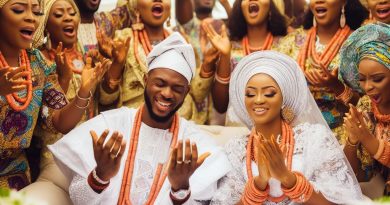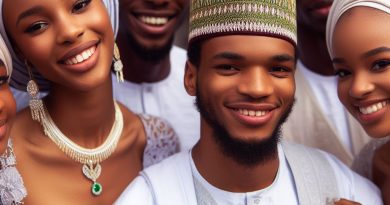Stories of Love: Real-life Nigerian Marriage Contract Tales
Last Updated on January 28, 2024
Introduction
Let’s explore stories of love: Real-life Nigerian marriage contract tales.
In this blog section, we will explore the significance of sharing real-life stories of Nigerian marriage contracts.
These narratives shed light on the intricacies and complexities of marriage in Nigeria, providing valuable insights into the cultural dynamics and challenges faced by couples.
By learning from these experiences, we can gain a deeper understanding of the institution of marriage and foster empathy and support for those navigating similar paths.
Ahmed and Zainab: Love conquers all
Background of the couple and their journey to marriage
Ahmed and Zainab, both born and raised in Nigeria, met in college.
They quickly became close friends and eventually fell in love.
Their families were initially against their relationship due to cultural differences.
Despite the opposition, Ahmed and Zainab were determined to be together.
They faced numerous challenges, but their love only grew stronger as they overcame each obstacle.
Challenges faced during the marriage contract negotiation process
Ahmed and Zainab came from different religious backgrounds, leading to disagreements during the negotiation process.
They had to find a middle ground that respected both their beliefs and values.
Financial matters also caused tension between the couple and their respective families.
They had to navigate discussions about dowry, wedding expenses, and household expenses.
Additionally, their families had differing expectations and traditions regarding wedding ceremonies and customs.
How their love and determination overcame all obstacles
Ahmed and Zainab prioritized open communication and compromise throughout the negotiation process.
They sought the guidance of a trusted elder who helped mediate discussions between their families.
Both Ahmed and Zainab were willing to make sacrifices to ensure a harmonious marriage.
They respected each other’s beliefs and values, constantly reinforcing their love and commitment.
Through patience and understanding, they were able to find common ground and reach a marriage contract that satisfied both families.
Lessons learned from their experience
- Love is not always easy, but with determination, it can conquer all obstacles.
- Open and honest communication is key to resolving conflicts during the negotiation process.
- Respecting each other’s beliefs and values is crucial for a successful marriage contract.
- Seeking the guidance of a mediator can help navigate difficult discussions between families.
- Patience and understanding are essential virtues when dealing with cultural and religious differences.
In short, Ahmed and Zainab’s journey to marriage was filled with challenges and obstacles.
Their love and determination, however, allowed them to overcome every hurdle they faced.
Through open communication, compromise, and respect for each other’s beliefs, they were able to negotiate a marriage contract that satisfied both families.
Their experience teaches us the importance of patience, understanding, and seeking guidance during the negotiation process.
Love truly conquers all, no matter the cultural or religious differences.
Read: Diamond, Gold, or Silver? Picking the Right Material in Nigeria
Mariam and Nosike: Cultural clashes and compromises
Introduction to the couple’s different cultural backgrounds
Mariam, a Yoruba woman, and Nosike, an Igbo man, come from diverse Nigerian cultural backgrounds.
Cultural clashes encountered in the marriage contract negotiations
During the negotiations, Mariam’s family insisted on traditional Yoruba customs, while Nosike’s family favored Igbo customs.
Strategies used to reach compromises and find common ground
- Mariam and Nosike sought guidance from elders who had experience in mediating such cultural disputes.
- They both agreed to attend marriage counseling sessions to better understand each other’s cultural values.
- Mariam and Nosike took part in joint activities that allowed them to learn more about each other’s customs, fostering empathy and understanding.
- They established clear communication channels and openly discussed their expectations and concerns to avoid misunderstandings.
Reflection on the importance of cultural sensitivity in Nigerian marriages
Mariam and Nosike’s story highlights the significance of cultural sensitivity in Nigerian marriages.
Respecting and embracing each other’s cultural differences can lead to a harmonious and fulfilling marriage.
It is crucial for couples to prioritize open dialogue, compromise, and mutual understanding during the marriage contract negotiations.
By appreciating their diverse backgrounds, couples can build a stronger foundation for their marriage and future together.
Read: Real Stories: Nigerian Couples Who Chose to Marry Immediately
Tunde and Funmi: Navigating Financial Matters
In this section, we will delve into the topic of financial challenges faced by Nigerian couples when negotiating their marriage contracts.
We will also share the personal story of Tunde and Funmi, a couple who faced these challenges and successfully navigated through them.
Lastly, we will provide useful tips and advice for couples looking to achieve financial harmony in their marriage contracts.
Overview of Financial Challenges Faced by Nigerian Couples
When it comes to negotiating marriage contracts, financial matters can be one of the biggest challenges faced by Nigerian couples.
With the ever-rising cost of living and societal expectations, couples often find it difficult to align their financial goals and expectations.
Many Nigerian couples struggle with determining how their finances will be managed, including decisions around joint or separate accounts, budgeting, and financial responsibilities.
These decisions can often lead to disagreements and conflicts that can strain the marriage.
Personal Story: Tunde and Funmi’s Experience
Tunde and Funmi, like many other Nigerian couples, faced their fair share of challenges when negotiating their marriage contract.
Both came from different financial backgrounds, with Tunde being more frugal and focused on saving, while Funmi enjoyed indulging in luxury items.
Initially, Tunde and Funmi found it difficult to discuss their financial expectations openly.
However, they soon realized that trust and transparency were crucial in overcoming these challenges.
They decided to have an honest conversation about their individual financial strengths, weaknesses, and long-term goals.
After much discussion, Tunde and Funmi reached a compromise.
They decided to maintain separate bank accounts for personal expenses while opening a joint account for shared expenses such as rent, groceries, and utility bills.
They also agreed to establish a monthly budget and savings plan to achieve their financial goals together.
Tips and Advice for Navigating Financial Matters
Based on Tunde and Funmi’s experience, here are some helpful tips and advice for couples negotiating financial matters in their marriage contracts:
- Start with open and honest communication about your financial expectations, strengths, and weaknesses.
- Establish mutual financial goals and develop a plan to achieve them together.
- Consider maintaining separate bank accounts for personal expenses to maintain financial autonomy.
- Create a joint account for shared expenses to ensure transparency and shared responsibility.
- Develop a monthly budget and savings plan to track and manage your finances effectively.
- Regularly assess and review your financial progress to make necessary adjustments and stay on track.
Remember that navigating financial matters requires ongoing communication, compromise, and understanding.
It is essential to be transparent with each other and work as a team to achieve financial harmony in your marriage contract.
The Role of Trust and Transparency in Financial Discussions
In any marriage contract, trust and transparency are foundational elements for successful financial discussions.
Couples must trust each other with their financial information, be open about their financial goals and concerns, and be willing to compromise for the benefit of the relationship.
Trust and transparency help to foster a healthy financial relationship where both individuals feel valued and heard.
It also minimizes the chances of financial secrets or hidden debts that could potentially harm the marriage in the future.
In fact, financial matters can be a significant challenge for Nigerian couples when negotiating their marriage contracts.
However, with open communication, trust, and transparency, couples like Tunde and Funmi can successfully navigate these challenges and achieve financial harmony in their relationship.
Read: Marriage Duas from the Quran and Hadith: A Compilation

Discover More: Seeking Guidance: A Nigerian Couple’s Prayer for Decision Making
Fadeke and David: Balancing tradition and modernity
Explanation of the tension between traditional and modern values in Nigerian marriages
When it comes to Nigerian marriages, there is often a tension between traditional values and modern ideals.
While tradition plays a significant role in these unions, the increasing influence of modernity has led to a clash of ideas and beliefs.
Real-life account of a couple who successfully balanced tradition and modernity in their marriage contract
One couple, Fadeke and David, managed to navigate this delicate balance in their marriage contract.
Their real-life account serves as an example of successfully incorporating both traditional and modern elements.
Fadeke and David recognized the importance of tradition in their Nigerian culture.
They understood that honoring their ancestry and upholding long-standing customs were vital.
At the same time, they were progressive individuals who wanted to embrace modern values and practices.
Insights on the benefits and challenges of embracing both traditional and modern elements
This couple’s journey highlights the benefits of finding the equilibrium between tradition and modernity.
By incorporating traditional elements, they were able to demonstrate respect for their heritage and bring their families together in celebration.
These customs included a traditional engagement ceremony, where both families officially agreed to the union.
However, Fadeke and David also acknowledged the merits of modern ideals in their marriage contract.
They sought to build a partnership based on equality, trust, and communication.
They decided to make joint decisions in their relationship, where both voices were heard and valued.
Suggestions for couples seeking to achieve a similar balance in their own marriage contracts
Additionally, they recognized the importance of financial independence and agreed to contribute equally to their household expenses.
They also shared responsibilities in raising their children, defying traditional gender roles and stereotypes.
Embracing both tradition and modernity in their marriage came with its challenges. Navigating the expectations of their families and communities often proved complex.
However, Fadeke and David managed to find common ground and create a marriage contract that honored tradition while embracing modern values.
To achieve a similar balance, couples should openly discuss their expectations and values from the beginning of their relationship.
It is essential to understand each other’s cultural backgrounds and beliefs, and find ways to incorporate them into the marriage contract.
Both partners should actively participate in decision-making processes and take into consideration the opinions and desires of one another.
Creating a sense of equality and mutual respect is crucial in successfully blending tradition and modernity.
Couples can also seek guidance and advice from those who have successfully balanced tradition and modernity in their own marriages.
Learning from real-life experiences can provide valuable insights and help navigate potential challenges.
In essence, Fadeke and David’s story of balancing tradition and modernity in their marriage contract serves as an inspiration for couples facing the same dilemma.
By acknowledging the benefits of both traditional and modern values, and actively working towards finding a middle ground, couples can build a strong and harmonious union.
Read: Marriage Duas in a Modern Context: Relevance and Use
Emeka and Chika: Overcoming Societal Expectations
In Nigerian culture, societal pressure and expectations can heavily influence a couple’s decisions, especially when it comes to marriage.
However, Emeka and Chika’s love story is a shining example of how they overcame societal norms in their marriage contract negotiations, prioritizing their individual happiness instead.
Introduction to Societal Pressure and Expectations Faced by Nigerian Couples
For generations, Nigerian couples have faced immense pressure from society to conform to certain expectations in their marriages.
These expectations often revolve around gender roles, family dynamics, and cultural traditions.
However, it is crucial to recognize that every couple is unique, with their own dreams, aspirations, and preferences.
Emeka and Chika understood this, and they decided to challenge societal norms to create a marriage contract that truly reflected their values.
Personal Account of a Couple Who Defied Societal Norms in Their Marriage Contract Negotiations
Emeka and Chika’s journey began when they met at university.
They fell in love and knew they wanted to spend their lives together.
However, as they delved deeper into their relationship, they realized that their desires did not align with what society expected of them.
Traditionally, Nigerian marriages involve extensive involvement from both families, particularly in matters such as finance, housing, and even career choices.
Emeka and Chika, however, sought to break free from these constraints and create a marriage contract that provided them with the freedom to pursue their individual goals.
They faced opposition from their families and friends who believed they were being unrealistic and selfish.
Nevertheless, Emeka and Chika remained steadfast in their resolve to prioritize their own happiness.
They understood that a successful marriage should be based on mutual respect, love, and understanding, rather than conforming to societal expectations that may not align with their values.
They knew that compromise was essential, but it should not come at the expense of their personal fulfillment.
Reflection on the Importance of Prioritizing Individual Happiness over Societal Expectations
Emeka and Chika’s story serves as a powerful reminder that prioritizing individual happiness is crucial for a fulfilling and sustainable marriage.
Succumbing to societal expectations can lead to resentment, unhappiness, and a sense of lost identity.
By prioritizing their own happiness, Emeka and Chika were able to create a marriage contract that aligned with their personal goals and aspirations.
This allowed them to flourish as individuals, which, in turn, strengthened their relationship.
It is essential for couples to remember that societal expectations are not set in stone.
Each marriage is unique, and it should be built on a foundation of love, trust, and open communication.
Encouragement and Advice for Couples Struggling with Societal Pressure
If you find yourself facing societal pressure and struggling to conform to expectations in your marriage, remember that your happiness should be a priority.
Here are a few words of encouragement and advice:
- Communicate openly with your partner about your desires, expectations, and concerns.
- Seek support from like-minded friends, family members, or even professional counselors who can provide guidance.
- Take the time to discover your own identity and dreams outside of societal expectations.
- Remember that compromise is important, but it should not require sacrificing your own joy and fulfillment.
- Believe in your love and the strength of your relationship, even in the face of opposition.
Ultimately, Emeka and Chika’s story teaches us that true happiness in a marriage comes from staying true to oneself and standing up against societal pressures.
In general, couples should have the courage to defy societal expectations that may limit their individual happiness.
Emeka and Chika’s love story is a testament to the power of prioritizing personal fulfillment in creating a fulfilling marriage contract.
Conclusion
The real-life Nigerian marriage contract tales presented in this section illustrate the complexity and richness of love stories in Nigeria.
These tales offer a glimpse into the challenges, triumphs, and lessons learned in the context of marriage.
We encourage readers to share their own stories and experiences, as these narratives have the power to educate, inspire, and connect people on a deeper level.
By sharing our stories, we foster empathy, understanding, and a sense of community.
It is significant to realize the importance of sharing and learning from these stories.
They provide valuable insights into the nuances of Nigerian culture, traditions, and the dynamics of relationships.
Through these tales, we gain a better understanding of the complexities of love, marriage, and the human experience.
They teach us about resilience, sacrifice, compromise, and the power of love to overcome obstacles.
By sharing and learning from these stories, we can foster dialogue, promote cultural exchange, and bridge the gap between different perspectives.
Ultimately, this exchange of stories contributes to a more inclusive and empathetic society.
The real-life Nigerian marriage contract tales presented here remind us of the universality of love and the importance of human connection.
They inspire us to cherish our own love stories and celebrate the beautifully diverse tapestry of relationships.


